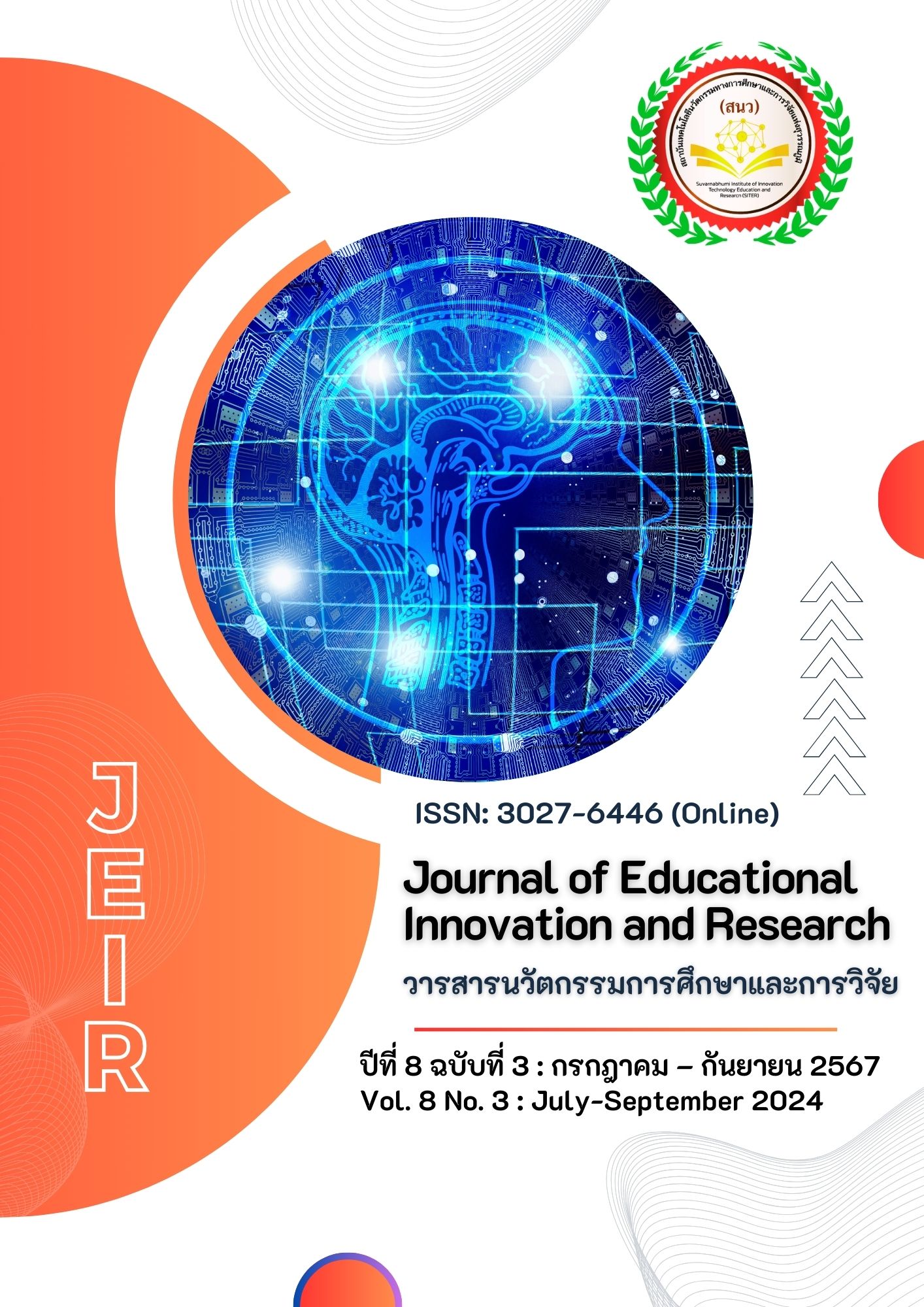ลักษณะของงานทางคณิตศาสตร์ที่พัฒนาสมรรถนะหลักของนักเรียน ด้านคณิตศาสตร์ในชีวิตประจำวัน
Main Article Content
บทคัดย่อ
การวิจัยนี้มีวัตถุประสงค์เพื่อศึกษาลักษณะของงานทางคณิตศาสตร์ที่พัฒนาสมรรถนะหลักของนักเรียนด้านคณิตศาสตร์ในชีวิตประจำวัน เป็นการวิจัยเชิงสำรวจ มีกลุ่มเป้าหมายที่ใช้ในการวิจัย คือ อาจารย์ด้านคณิตศาสตร์ศึกษา ครูคณิตศาสตร์ และนักเขียน / ออกแบบตำราเรียนคณิตศาสตร์ ซึ่งผู้วิจัยเลือกแบบเจาะจง รวมจำนวน 9 คน เครื่องมือในการเก็บรวบรวมข้อมูล ได้แก่ แบบสอบถามความคิดเห็นของผู้เชี่ยวชาญเกี่ยวกับลักษณะของงานทางคณิตศาสตร์ที่พัฒนาสมรรถนะหลักของนักเรียนด้านคณิตศาสตร์ในชีวิตประจำวัน และวิเคราะห์ข้อมูลด้วยการวิเคราะห์เนื้อหา ผลการวิจัยพบว่า งานทางคณิตศาสตร์ที่พัฒนาสมรรถนะหลักของนักเรียนด้านคณิตศาสตร์ในชีวิตประจำวันมีลักษณะสำคัญที่ต้องพิจารณาใน 5 มิติ ดังนี้ มิติที่ 1 บริบทที่ใช้ในงาน บริบทควรมีการเชื่อมโยงกับชีวิตประจำวันของนักเรียนและไม่ซับซ้อนจนเกินความสามารถของนักเรียนในการทำความเข้าใจได้ มิติที่ 2 ปัญหาและคำตอบของปัญหาในงาน ปัญหาควรมีความสมจริง และคำตอบและการหาคำตอบ ควรมีคุณค่าสำหรับนักเรียน มิติที่ 3 ความรู้ความสามารถพื้นฐานที่ใช้ในการทำงาน ควรเน้นการใช้ความรู้ความสามารถที่กำหนดตามขอบเขตของหลักสูตร และมีความยากง่ายของเนื้อหาเหมาะสมกับระดับของนักเรียน มิติที่ 4 กระบวนการในการทำงาน ควรเน้นการบูรณาการความรู้ ทักษะและกระบวนการ เจตคติ รวมถึงคุณลักษณะอันพึงประสงค์ทางคณิตศาสตร์ และส่งเสริมให้เกิดกระบวนการเสริม เช่น การสำรวจ การสืบเสาะ และมิติที่ 5 ความต้องการเชิงการรู้งานหรือระดับ การคิดที่ใช้ในการทำงานให้สำเร็จ ควรเป็นงานที่มีการคิดระดับสูง
Article Details

อนุญาตภายใต้เงื่อนไข Creative Commons Attribution-NonCommercial-NoDerivatives 4.0 International License.
เอกสารอ้างอิง
Barnes, H. (2004). Realistic mathematics education: Eliciting alternative mathematical conceptions of learners. African Journal of Research in Mathematics, Science and Technology Education, 8(1), 53–64. http://dx.doi.org/10.1080/10288457.2004.10740560
Berisha, V., & Bytyqi, R. (2020). Types of mathematical tasks used in secondary classroom instruction. International Journal of Evaluation and Research in Education, 9(3), 751–758.
Boonmaton, R., Supap, W., & Viriyapong, R. (2018). An Action Research on Developing Grade 11 Students’ Mathematical Literacy on Probability Using context-Based Learning. Academic Services Journal, Prince of Songkla University, 29(2), 51-61.
Doyle, W. (1988). Work in mathematics classes: The context of students’ thinking during instruction. Educational Psychologist, 23, 167-180.
Gibney, J. (2014). Provoking mathematical thinking: Experiences of doing realistic mathematics tasks with adult numeracy teachers. Adults Learning Mathematics: An International Journal, 9(2), 97–115.
Gravemeijer, K. (2004). Learning Trajectories and Local Instruction Theories as Means of Support for Teachers in Reform Mathematics Education. Mathematical Thinking and Learning, 6(2), 105-128.
Kohar, A. W., Wardani, A. K., & Fachrudin, A. D. (2019). Profiling context-based mathematics tasks developed by novice PISA-like task designers. Journal of Physics, 1200(012014),1-11. https://doi.org/10.1088/1742-6596/1200/1/012014
Lee, K.-H., Lee, E.-J., &, Park, M.-S. (2016). Task Modification and Knowledge Utilization by Korean Prospective Mathematics Teachers. Pedagogical Research, 1(2), 1 – 13.
Mosvold, R. (2005). Mathematics in everyday life A study of beliefs and actions [Department of Mathematics, University of Bergen]. https://core.ac.uk/download/pdf/30895663.pdf
National Council of Teachers of Mathematics [NCTM]. (1991). Professional standards for teaching mathematics. National Council of Teachers of Mathematics.
Nikolov, R., Shoikova, E. & Kovatcheva, E. (2014). Competence Based Framework for Curriculum Development. State University of Library Studies and Information Technologies. https://doi.org/ 10.13140/RG.2.1.4201.6086
Office of the Basic Education Commission. (2021). Curriculum Framework. Office of the Basic Education Commission. https://cbethailand.com/หลักสูตร-2/กรอบหลักสูตร/
Office of the Education Council. (2019a). Core Competency Framework for Students in Fundamental Education and Primary Education Levels (Grades 1–3)(1st digital ed.). Office of the Education Council. http://backoffice.onec.go.th/uploads/Book/1674-file.pdf
Office of the Education Council. (2019b). The public's manual for understanding competency easily, the people's edition, and understanding the competency-based curriculum simply for teachers, administrators, and educational personnel (1st digital ed.). Office of the Education Council. http://backoffice.onec.go.th/uploads/Book/1661-file.pdf
Office of the Education Council. (2019c). Report on Research and Development for the Competency Framework for Lower Primary Level Learners in the Fundamental Education Curriculum (1st digital ed.). Office of the Education Council. http://backoffice.onec. go.th/uploads/Book/1687-file.pdf
Office of the Education Council. (2019d). The Guidelines for the Development of Students' Competency in Fundamental Education (1st digital ed.). Office of the Education Council.http://backoffice. onec.go.th/uploads/Book/1687-file.pdf
Paredes, S., Cáceres, M. J., Diego-Mantecón, J. -M., Blanco, T. F., & Chamoso, J. M. (2020). Creating Realistic Mathematics Tasks Involving Authenticity, Cognitive Domains, and Openness Characteristics: A Study with Pre-Service Teachers. Sustainability, 12, 1–17.
Shimizu, Y., Kaur, B., Huang, R. & Clarke, D. J. (Eds.). (2010). Mathematical Tasks in Classrooms around the World. Sense Publishers.
Stein, M. K., and Smith, M. S. (1998). Mathematical Tasks as a Framework for Reflection: From Research to Practice. Mathematics Teaching in the Middle School, 3(4), 268–275.
Tatsis, K., and Maj-Tatsis, B. (2012). Assessing pre-service teachers’ works in realistic Mathematics. Hellenic Mathematical Society International Journal for Mathematics in Education, 4, 375–380.
The Institute for the Promotion of Teaching Science and Technology. (2013). PISA 2012 Project Preliminary Data Analysis Report (1st digital ed.). The Institute for the Promotion of Teaching Science and Technology. https://drive.google.com/file/d/0BwqFSkq5b7zSNXNDO HJsWXR WU0E/view?resourcekey=0-bVWeGo3x29CrmG70tK8-NQ
The Institute for the Promotion of Teaching Science and Technology. (2023, April 19). Mathematical Literacy. https://pisathailand.ipst.ac.th/about-pisa/mathematical-literacy/
Vos, P. (2018). “How Real People Really Need Mathematics in the Real World" - Authenticity in Mathematics Education. Education Sciences, 8(4), 1–14.
Vos, P. (2020). Task Contexts in Dutch Mathematics Education. In M. van den Heuvel-Panhuizen (Ed.), National Reflections on the Netherlands Didactics of Mathematics Teaching and Learning in the Context of Realistic Mathematics Education (pp. 31–53). Springer, Cham.


